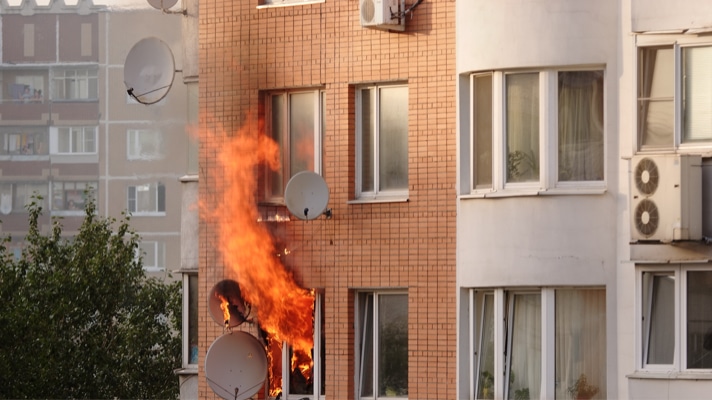This week’s question comes from Anonymous in San Mateo County, who asks: I saw an apartment building surrounded by firefighters and fire trucks. A fire started on a top floor, and from my viewpoint, they had already put out the flames. I thought about my living space and how I should prepare if a fire broke out in my building. I live in an apartment on the third floor. I have done some preparation since all this happened. What laws should I know for fire preparedness? Would the owners be responsible for all tenants if a fire occurred?
Hi Anonymous,
Thank you for your questions. Many safety standards are set to protect tenants from the situation you described. Understanding your rights in those circumstances is important to ensure that, in the unfortunate event a fire does break out, you are fully informed, and all standards were met by those that could be held responsible. Nearly 4000 Americans die yearly in house fires, and over 2000 are severely injured.
What are the safety standards to keep in mind?
In August 2016, the San Francisco Board of Supervisors passed legislation (Ordinance 163-16) to promote fire and life safety, reduce the risk of fires, and prevent property damage. The requirements include having building owners:
- Provide residential tenants with updated Tenant Fire Safety Disclosure Information on fire safety and smoke alarm requirements,
- post smoke and CO alarm information in common areas of their buildings,
- file and post a Statement of Compliance form for annual fire alarm testing, and
- post the building manager’s contact information at the building entry.
A great resource to check out before moving into an apartment in San Francisco is sanfrancisco.buildingeye.com/fire. This database keeps track of:
- Fire Permits from 01/01/1983
- Fire Complaints and Violations from 01/01/2010
- Fire Inspections from 01/01/2014
- Statement of Compliance (for required Apartment Buildings with Fire Alarm Systems)
- Additional data available from SF Department of Building Inspection and SF Planning Department.
How can you determine who is responsible when a fire starts in your apartment?
Causes of house fires vary. For example, faulty appliances or wiring cause the most significant number of house fires; heating devices, such as heaters, wood stoves, and fireplaces, are another leading cause; cigarettes are a further leading source of house fires. Determining what caused the fire is instrumental in determining who can be held liable.
The landlord, property owner, or manager has responsibility for a fire or accident resulting from dangerous conditions such as faulty wiring or failing to follow the standards outlined in the California Code of Regulations. However, suppose the tenant caused the hazardous condition that results in the fire, i.e., from a burning candle or leaving a cigarette unattended. In that case, there may not be legal liability as to the landlord, the property owner, or manager unless the landlord breached their duty to ensure there are properly working smoke alarms on the property. In many cases, tenants have been seriously injured because they were not adequately warned of a fire. Additionally, it is important to remember that some rental leases may attempt to limit liability for dangerous incidents such as fires. Therefore, it is essential that you carefully review any lease before signing.
What are some common signs that your landlord breached his or her duty of care as it relates to a poorly maintained electrical system?
Faulty wiring is not only one of the leading causes of fires in the United States but also one of the most common examples of landlord negligence. Although the landlord must have the local fire authority inspect all multifamily residential apartment buildings, in the state of California consisting of three or more units and up to 15, every so often landlords do not comply with this requirement. Most buildings in San Francisco were built well before 1990. Older properties frequently have not been updated to comply with current building codes. Some properties still have aluminum wiring, a known fire hazard. While others, may have outdated electrical systems that are unable to handle modern electrical appliances. Additionally, fire safety inspections only go so far as to inspect the common areas. Therefore, it is important to keep an eye out for things like – outlets that do not work, breaker boxes that flip often, blown fuses, mild electrical shocks, dimmed or flickering lights, outlets that work sporadically, power surges, burning smells, hot fixtures or switches, and soot around switches or outlets. Document all issues arising from faulty wiring and be sure to let your landlord know immediately if you notice anything out of the ordinary.
Although the landlord has a “reasonable time” to abate those issues, often they will ignore complaints unless and until they are required to handle them. In San Francisco, you can report your complaints and concerns online using the following link: https://sf-fire.org/services/report-complaints-concerns. This complaint will ensure that you not only put the landlord on notice of the issue, but you also notified the appropriate agency that will come out on your behalf and advise your landlord of what steps are appropriate and required to take to abate the issue.
Proving landlord negligence cases are not always easy. A skilled attorney will investigate the fire and employ experts to help prove that your landlord breached a duty that was owed to you. A full investigation of the cause of the fire may reveal other issues that your landlord may bear responsibility for as it relates to the fire.
What damages can you claim if a fire breaks out in your apartment at no fault of your own?
Landlord insurance is a form of liability insurance that pays for claims caused by landlord negligence. Various damages can be claimed depending on the degree to which the landlord was negligent and whether the fire caused property damage and injury. While landlord insurance is not required by law, it may be required by the landlord’s home insurance provider. If a landlord has tenants occupying their property for at least 30 continuous days, most homeowners insurance companies will require them to carry landlord insurance instead of homeowners insurance.
Typically, you can recover the cost to replace lost or damaged personal property, the cost to restore the personal property, relocation expenses, additional living expenses, general damages for mental anguish, and in some instances, punitive damages. Punitive damages are used to set an example of the landlord when their conduct is beyond that of garden variety negligence which is why it is essential to document everything.
In many instances, an apartment fire causes injury. Burn victims are entitled to compensation for their past and future medical expenses, past and future lost wages, and pain and suffering. In catastrophic burn injury cases, the assistance of a life care planner may be necessary to compensate you for long-term medical problems fully. In the case of wrongful death, loved ones may be able to receive compensation for the loss.
Suppose you have been injured and sustained damages because of a fire. In that case, the landlord may claim the fire is not their responsibility or push you to his insurance company to negotiate a quick settlement. If you have been the victim of an apartment fire, you deserve to speak with an experienced attorney dedicated to maximizing your recovery. An experienced burn injury attorney is particularly essential in the event of injury, as burns often lead to long-term physical and mental harm such as scarring and PTSD.









